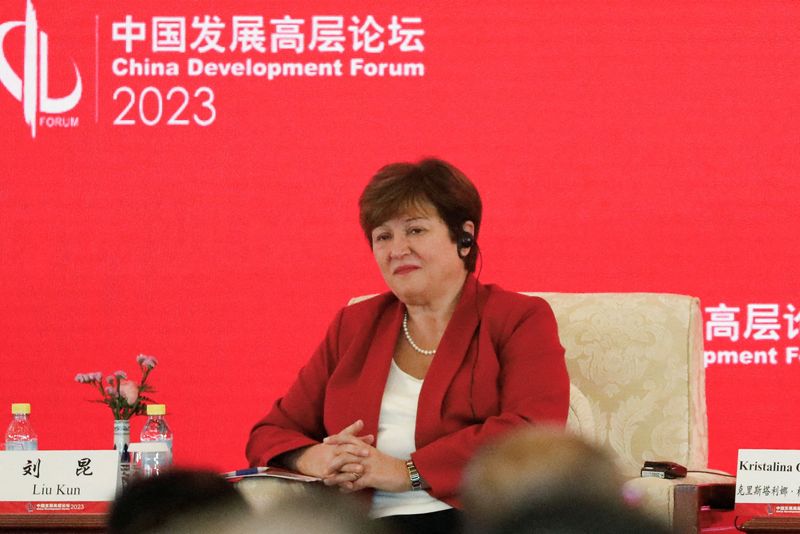
© Reuters. FILE PHOTO: International Monetary Fund (IMF) Managing Director Kristalina Georgieva attends the China Development Forum 2023, in Beijing, China, March 26, 2023. REUTERS/Jing Xu
By Andrea Shalal
WASHINGTON (Reuters) – International Monetary Fund chief Kristalina Georgieva said she told China’s new top economic official, Li Qiang, that China must accelerate its work to reach debt restructuring agreements for countries like Zambia, Ghana and Ethiopia.
Georgieva, who met with Li and other top Chinese officials during a visit to China last month, said on Thursday that she found Li very approachable and pragmatic, and he assured her that he wants China to play a constructive role in resolving debt relief cases.
“The truth is, and I was … very straightforward on that, it takes far too long for that (debt) resolution,” she told an event hosted by Meridian House and Politico. “Yes, China has multiple institutions that deal with that, that makes it complicated domestically, but they have to speed up their participation.”
The United States and other Western countries have faulted China for causing delays in setting up restructuring agreements for heavily indebted countries that have asked for help under the Common Framework set up by the Group of 20 major economies.
Georgieva noted China had been helpful in reaching a debt relief deal for Chad, and also Sri Lanka, a middle-income country that was not eligible for help under the G20 framework, and she encouraged China to show progress on other cases.
About 60% of low-income countries are already in or at risk of debt distress, and about 25% of emerging economies are at high risk and facing “default-like” borrowing spreads, Georgieva said.
Georgieva said that during her visit Chinese officials underscored their commitment to multilateralism, opening up China’s economy for more trade, and debt restructuring.
The IMF this week said rising geopolitical tensions and the resulting fragmentation of the global economy could increase financial stability risks, reducing cross-border investments, asset prices, payment systems and banks’ ability to lend.
The global lender has long warned of increased costs, economic friction and GDP output losses associated with the global economy’s fragmenting into geopolitical blocs, with U.S.-led democracies on one side and China and other autocratic states on another. Those concerns have been heightened since Russia’s invasion of Ukraine.
Georgieva said Chinese officials also worried about fragmentation, but their foremost concern was securing jobs at home, with a target of creating 12 million jobs this year.





